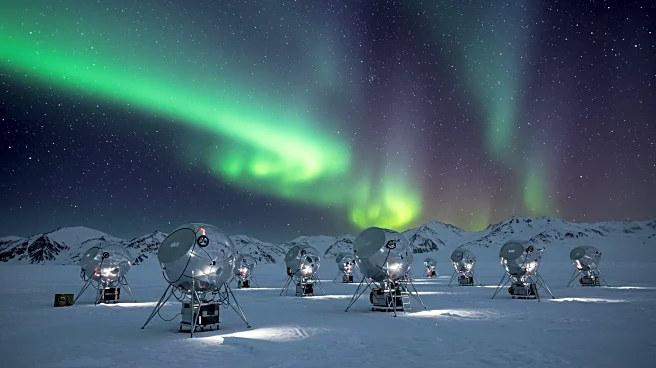What is the story about?
What's Happening?
The IceCube Neutrino Detector, located in Antarctica, is preparing for significant technological enhancements. Celebrating its 20th anniversary, IceCube is renowned for its unique setup of 5,160 digital sensors embedded in a massive Antarctic glacier. These sensors are crucial for detecting ultra-high-energy neutrinos, which are often found in cosmic rays. The upcoming upgrades aim to expand the detector's capabilities, making it larger and more powerful. The enhancements will include new sensors and improved understanding of the glacier's optical properties, which are essential for accurate neutrino detection. Carlos Argüelles-Delgado, an astrophysicist at Harvard University, has been involved with IceCube since its inception and highlights the importance of these upgrades for advancing neutrino physics.
Why It's Important?
The upgrades to the IceCube Neutrino Detector are significant for the field of astrophysics and particle physics. Neutrinos are fundamental particles that play a crucial role in understanding cosmic phenomena and the universe's energy density. By enhancing IceCube's capabilities, scientists can better study neutrino interactions and their quantum behaviors, potentially leading to breakthroughs in understanding neutrino mass mechanisms. This research could have profound implications for quantum mechanics and the fundamental laws of physics. Additionally, the ability to detect higher energy neutrinos could provide insights into cosmic events and the universe's structure, benefiting scientific knowledge and technological advancements.
What's Next?
The next steps for IceCube involve the installation of new sensors and cameras to better survey the glacier and improve the detection of lower-energy neutrinos. These upgrades are expected to enhance the understanding of neutrino flavor oscillation, a quantum mechanical phenomenon. The IceCube-Gen2 project will focus on expanding the detector's capabilities, allowing for more precise measurements and potentially discovering new neutrino behaviors. The scientific community anticipates that these advancements will lead to new discoveries in neutrino astrophysics and contribute to solving existing mysteries about neutrino masses and their interactions.
Beyond the Headlines
The IceCube Neutrino Detector's upgrades could have broader implications beyond immediate scientific discoveries. The enhanced understanding of neutrino interactions may influence future research in quantum mechanics and particle physics, potentially leading to new technologies and applications. The project's success could also inspire similar large-scale scientific endeavors, promoting international collaboration and innovation in the field of astrophysics. Furthermore, the advancements in detecting cosmic phenomena may contribute to a deeper understanding of the universe's origins and evolution, impacting philosophical and cultural perspectives on humanity's place in the cosmos.
















